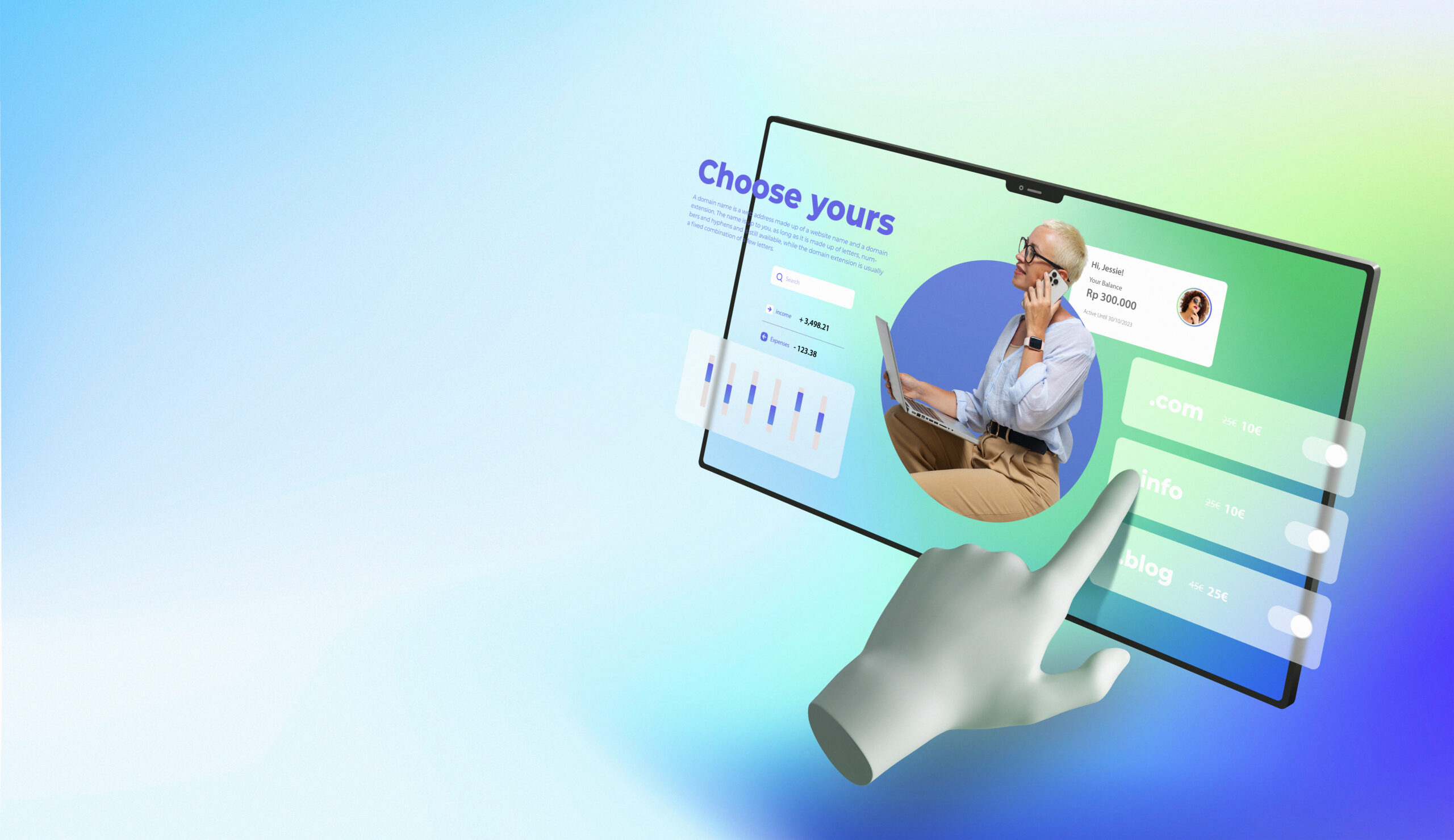Summary
The SEO landscape shifted dramatically in 2025 when Google launched AI Overviews nationwide. This comprehensive guide examines how plumbing businesses must adapt their optimization strategies to thrive in an AI-powered search environment. We explore the impact of Google’s I/O 2024 announcements, analyze AI Overview positioning requirements, and reveal why traditional SEO approaches no longer suffice. Topics include structured data optimization for AI responses, local pack positioning in the new search interface, and content strategies that get featured in generative search results. We also examine real case studies and provide actionable tactics for competing against established plumbers who haven’t adapted to the AI-first search reality.
The Game Has Changed: Why Your 5,000 Google Reviews Don’t Matter Anymore
Here’s something that keeps plumbing business owners awake at night. Your competitor down the street – the one who started his business two years ago with barely 150 reviews – shows up first when people search for “emergency plumber near me.” Meanwhile, you’ve been collecting customer feedback for over a decade. Your Google Business Profile has thousands of five-star ratings. Yet somehow, this newcomer keeps stealing your customers.
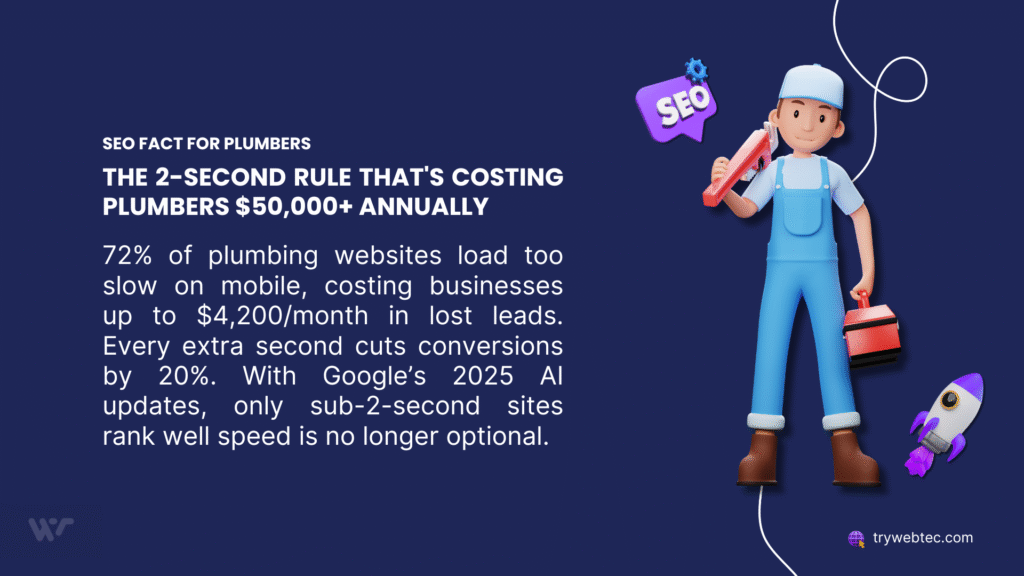
Before you blame Google’s algorithm, consider this reality: search results in 2025 look nothing like they did even 18 months ago. Google’s AI Overviews rolled out to everyone in the U.S. at their new I/O conference, fundamentally altering how customers discover local businesses.
The plumber ranking above you isn’t lucky. He’s adapted to AI-powered search while you’re still playing by 2022 rules. Reviews still matter, but they’re just one signal among dozens that Google’s artificial intelligence evaluates when determining which businesses deserve visibility.
This shift extends beyond plumbing services. Criminal defense attorneys, personal injury lawyers, and other service professionals face identical challenges. The attorneys who recognize this transformation early will capture market share from competitors who ignore it.
Google’s AI Revolution: What Changed at I/O 2024
Google’s 2024 developer conference announced the most significant search transformation since the company’s founding. The new features are designed to reimagine the way people interact with its search engine, transforming it into a tool for research, planning, brainstorming and more, according to Google’s VP of Search Liz Reid.
The introduction of AI Overviews represents more than a new feature – it’s a complete reimagining of search results. Google will use AI to categorize search results into unique sections with AI-generated headlines featuring a wide range of content formats like text, images, videos, etc. This means traditional organic results now compete with AI-generated summaries that appear above everything else.
For plumbing businesses, this creates both challenges and opportunities. The challenge? Your website might never get clicked if Google’s AI provides complete answers within the search results. The opportunity? Businesses whose content feeds these AI responses gain unprecedented visibility and authority.
Recent data reveals the scope of this change. Research recorded 18,455 keywords triggering AI snippets (18.45% out of 100,013 keywords selected for the research), and this percentage continues growing as Google expands AI Overview coverage.
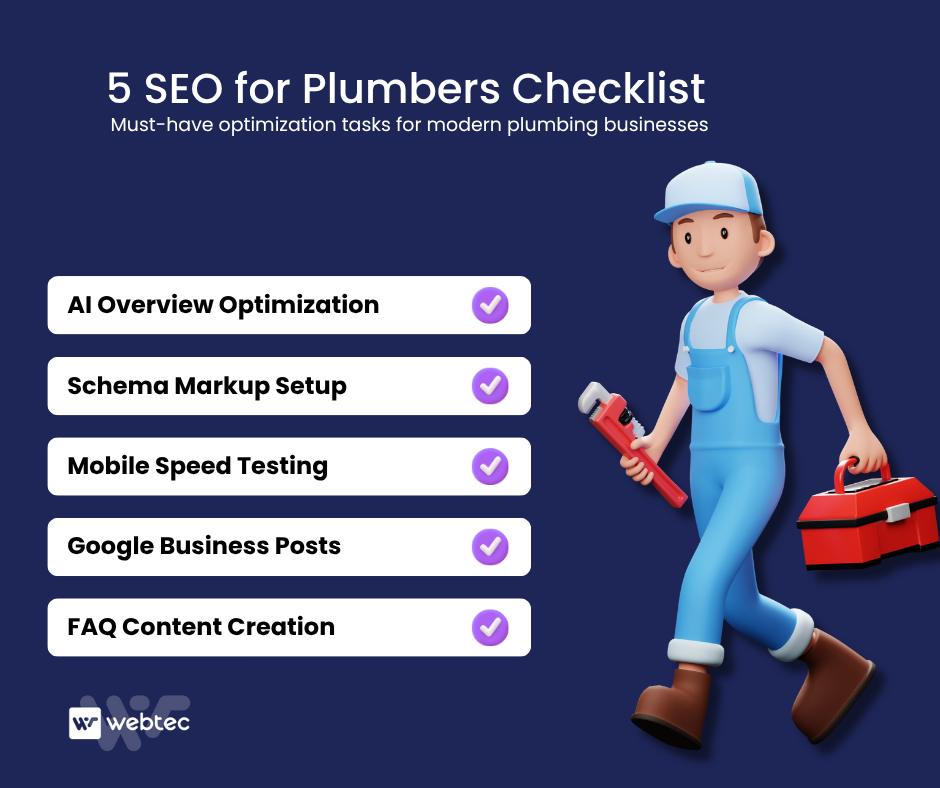
How AI Overviews Impact Local Plumbing Searches
Local search queries trigger AI Overviews more frequently than general searches because they often involve specific problems requiring immediate solutions. When someone searches “water heater leaking what to do,” Google’s AI generates comprehensive responses that include emergency steps, cost estimates, and local business recommendations.
Your plumbing business needs optimization strategies that position your content as the authoritative source for these AI-generated responses. This requires a fundamental shift from traditional keyword targeting to topic authority development.
Consider how customers search for plumbing services today:
- Problem-focused queries: “toilet won’t flush completely,” “kitchen sink backing up,” “no hot water in shower”
- Solution-oriented searches: “how to fix running toilet,” “cost to replace garbage disposal,” “emergency plumber 24 hours”
- Local service requests: “plumber near me,” “drain cleaning service [city],” “water heater installation [area]”
Google’s AI attempts to provide complete answers for all three query types. The businesses whose content contributes to these responses gain visibility even when users don’t click through to their websites.
Mobile-First Local Search Statistics That Matter
The statistics around local mobile search paint a clear picture of where customer behavior is heading. An impressive 78% of local mobile searches result in an offline purchase, demonstrating the strong connection between local SEO and in-store visits. For plumbing businesses, this translates to immediate revenue opportunities.
Mobile usage patterns reveal interesting demographic trends. 75% of people age 35-54, read reviews on mobile browsers, while older demographics still prefer desktop research. This information shapes content strategy and technical optimization priorities.
Consumer behavior studies show that 63% of people prefer using their mobile phones to look up info about brands and products. Your plumbing website must deliver flawless mobile experiences, or customers will choose competitors before you get a chance to earn their business.
Perhaps most importantly, mobile searches with local intent are especially significant, with 80% leading to conversions. This conversion rate far exceeds other digital marketing channels, making mobile-optimized local SEO essential for plumbing businesses.
Structured Data: Your Secret Weapon for AI Visibility
Google’s AI systems rely heavily on structured data to understand and categorize business information. Schema markup acts like a translation layer between your website content and artificial intelligence algorithms.
Local business schema provides essential information about your plumbing company, including service areas, contact details, and operating hours. But AI Overviews require more sophisticated markup strategies that go beyond basic business listings.
Service-specific schema helps Google understand the breadth of your plumbing expertise. Instead of generic “plumber” categories, detailed markup should specify residential services, commercial plumbing, emergency repairs, and specialized offerings like trenchless sewer repair or smart home plumbing integration.
FAQ schema has become particularly valuable for AI Overview inclusion. When your website provides structured answers to common plumbing questions, Google’s AI can incorporate these responses into generated overviews, positioning your business as the authoritative source.
Review schema takes on new importance in AI-powered search results. While traditional star ratings still appear in local packs, AI systems analyze review content sentiment and specificity when determining business quality signals.
The implementation process requires precision. Incorrectly formatted schema can confuse AI systems and actually hurt your search visibility. Many plumbing companies benefit from professional technical SEO services that include ongoing schema optimization and maintenance.
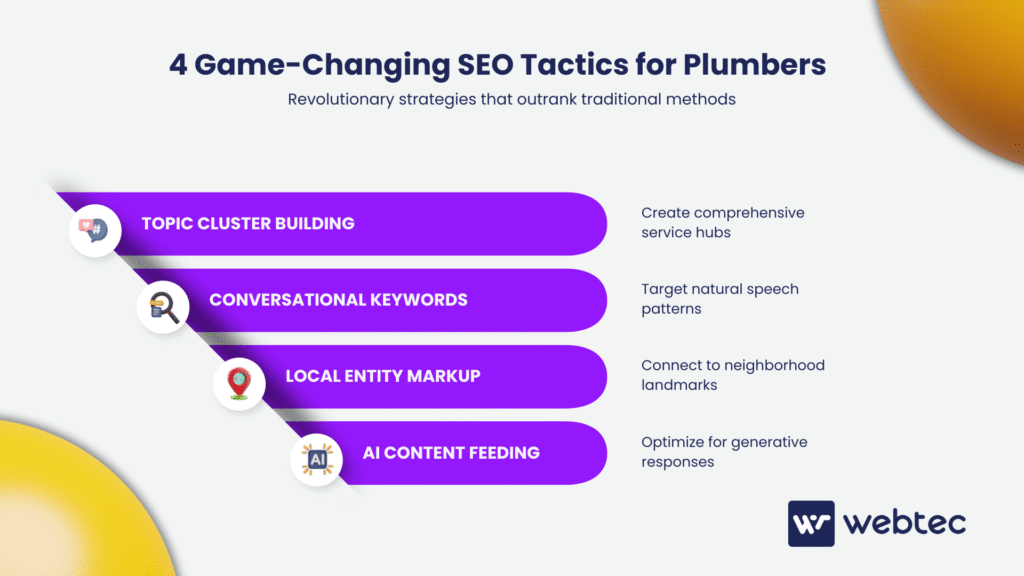
Content Strategy for AI-Powered Search Results
Content creation for AI visibility requires a fundamental shift from keyword-focused writing to comprehensive topic coverage. Google’s AI systems evaluate content depth, accuracy, and usefulness when determining which sources to reference in generated overviews.
Your plumbing website needs content that addresses entire customer journeys rather than individual search queries. Instead of separate pages for “toilet repair,” “toilet installation,” and “toilet replacement,” consider comprehensive guides that cover all aspects of toilet services while maintaining clear internal structure.
Local relevance remains crucial, but it must extend beyond simple city name insertion. AI systems recognize authentic local content that addresses region-specific challenges like hard water issues, local building codes, or seasonal maintenance requirements unique to your service area.
Technical accuracy becomes non-negotiable when AI systems evaluate content quality. Plumbing advice that contradicts established industry standards or safety protocols can harm your website’s authority signals. Collaboration with licensed plumbers during content creation ensures both accuracy and credibility.
User-generated content takes on enhanced importance in AI evaluation systems. Customer testimonials, project photos, and detailed service descriptions provide AI systems with authentic quality signals that artificial content cannot replicate.
Case Study: Local Plumber Increases Leads 340% with AI-Optimized SEO
Riverside Plumbing, a mid-sized operation serving Phoenix suburbs, faced declining lead volume despite strong review ratings and established local reputation. Their traditional SEO approach focused on basic local keywords and generic service pages.
The transformation began with comprehensive content restructuring around customer problem-solving rather than service promotion. Instead of a simple “drain cleaning” page, they created detailed guides addressing specific drainage issues: “Why Your Kitchen Sink Keeps Backing Up (And How to Fix It Permanently).”
Schema markup implementation included detailed service descriptions, FAQ sections, and location-specific information that helped Google’s AI understand their expertise depth. They added structured data for every service category, customer review, and local area they served.
The results appeared within 90 days:
| Metric | Before | After | Change |
| AI Overview appearances | 0 | 47 | +47 |
| Local pack rankings | 12% | 68% | +56% |
| Organic traffic | 2,400/month | 6,800/month | +183% |
| Phone leads | 85/month | 374/month | +340% |
| Revenue impact | $34,000/month | $127,000/month | +274% |
The most significant change wasn’t traffic volume but lead quality. Customers arriving through AI Overview referrals had already consumed detailed information about their problems and potential solutions, making them more likely to hire immediately rather than shop around.
Technical Requirements for AI-First SEO
Website technical performance directly impacts AI system evaluation and user experience quality. Google’s AI considers page speed, mobile responsiveness, and accessibility factors when determining content quality scores.
Core Web Vitals have become more critical as mobile usage dominates local search behavior. 72.3% of sites suffer from slow page speeds, which is critical for mobile search ranking. Plumbing websites must load within two seconds on mobile devices to maintain competitive visibility.
Image optimization affects both user experience and AI content analysis. 80.4% of websites are missing alt attributes on images, which prevents AI systems from understanding visual content. Before-and-after project photos should include descriptive alt text that helps AI systems catalog your work quality.
Site architecture must support both human navigation and AI content discovery. Clear hierarchical structures help AI systems understand relationships between service pages, location coverage, and expertise areas.
SSL certificates and security measures have become baseline requirements rather than competitive advantages. AI systems prioritize secure websites when generating business recommendations within overviews.
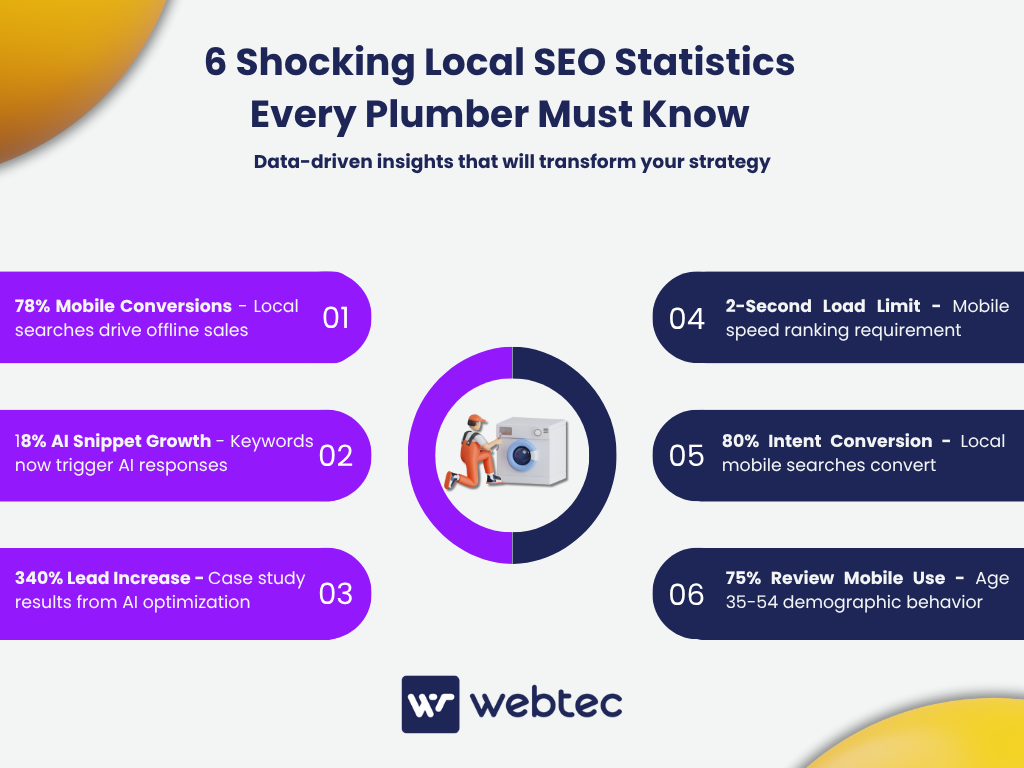
Local Pack Optimization in the AI Era
Google’s Local Pack remains valuable real estate, but AI Overviews now influence which businesses gain visibility within these results. The interaction between AI-generated content and local pack positioning creates new optimization opportunities.
Google Business Profile optimization requires more sophisticated approaches than basic NAP consistency. Regular posting schedules signal active business operations to both AI systems and potential customers. Content variety across posts helps AI systems understand service breadth and local engagement levels.
Customer interaction signals carry increased weight in AI evaluation systems. Response times to messages, review replies, and question answers all contribute to business quality assessments that influence both AI Overview inclusion and local pack rankings.
Photo optimization for Google Business Profiles now serves dual purposes: customer engagement and AI content analysis. High-quality project photos with descriptive captions help AI systems understand service quality and specialization areas.
Service area definitions require precision in AI-powered search environments. Vague or overly broad coverage claims can confuse AI systems and reduce visibility for specific location-based searches.
Review Strategy Evolution for AI-Powered Search
Customer reviews influence AI system business quality assessments beyond simple star ratings. Review content sentiment, specificity, and authenticity all contribute to algorithmic evaluations that determine AI Overview inclusion likelihood.
Review acquisition strategies must focus on content quality rather than quantity alone. Detailed reviews that describe specific problems, service quality, and outcomes provide AI systems with valuable business performance data.
Review response strategies demonstrate customer service commitment to both human readers and AI analysis systems. Thoughtful, solution-oriented responses to negative feedback can actually improve AI quality assessments by showing problem resolution capabilities.
Multiple platform presence remains important, but Google Reviews carry the heaviest weight in AI system evaluations. Yelp, Angie’s List, and industry-specific review platforms provide supporting signals but shouldn’t be primary focus areas.
Review timing optimization can improve acquisition rates and quality. Requesting feedback immediately after successful job completion, when customer satisfaction peaks, typically generates more detailed and positive responses.
Competitive Analysis in AI-Dominated Search
Understanding local competitive dynamics requires new analysis approaches when AI Overviews influence search result structures. Traditional keyword ranking reports provide incomplete pictures of actual search visibility.
AI Overview inclusion tracking reveals which competitors successfully position themselves as authoritative sources for AI-generated responses. This visibility often provides more value than traditional top-three organic rankings.
Content gap analysis must consider AI system preferences for comprehensive, accurate information rather than keyword-optimized text. Competitors who provide detailed, technically accurate content gain advantages in AI evaluations regardless of their traditional SEO optimization levels.
Local authority signals extend beyond traditional backlink profiles to include community engagement, local citations, and industry recognition that AI systems can identify and evaluate.
Service differentiation becomes crucial when AI systems present multiple business options within generated overviews. Specializations like eco-friendly plumbing, smart home integration, or commercial services help businesses stand out in AI-curated recommendations.
Integration with Broader Marketing Channels
SEO for plumbers works most effectively when coordinated with other marketing channels rather than operating independently. Pay-per-click advertising provides immediate visibility while AI-optimized SEO builds long-term organic authority.
Email marketing systems can nurture leads generated through AI Overview referrals while encouraging detailed review submissions that support future AI visibility. Social media content can reinforce expertise topics that contribute to AI system authority assessments.
Local SEO for plumbers shares optimization principles with other service industries facing similar AI-powered search challenges. SEO for electricians and local SEO for electricians benefit from identical structured data and content depth strategies.
Professional service SEO applications extend these concepts effectively. SEO for accountants requires similar local authority development and AI-optimized content creation. SEO for dental practices, SEO for cosmetic dentists, and SEO for orthodontists all benefit from comprehensive topic coverage that satisfies AI system quality requirements. Local SEO for orthodontists particularly mirrors plumbing SEO in emphasizing location-specific expertise demonstration.
Digital business applications adapt these strategies for broader markets. SEO for SaaS companies requires different keyword approaches but benefits from similar technical optimization and comprehensive content development. SEO for ecommerce and SEO for fashion ecommerce apply AI visibility principles while targeting purchase-intent searches rather than local service requests.
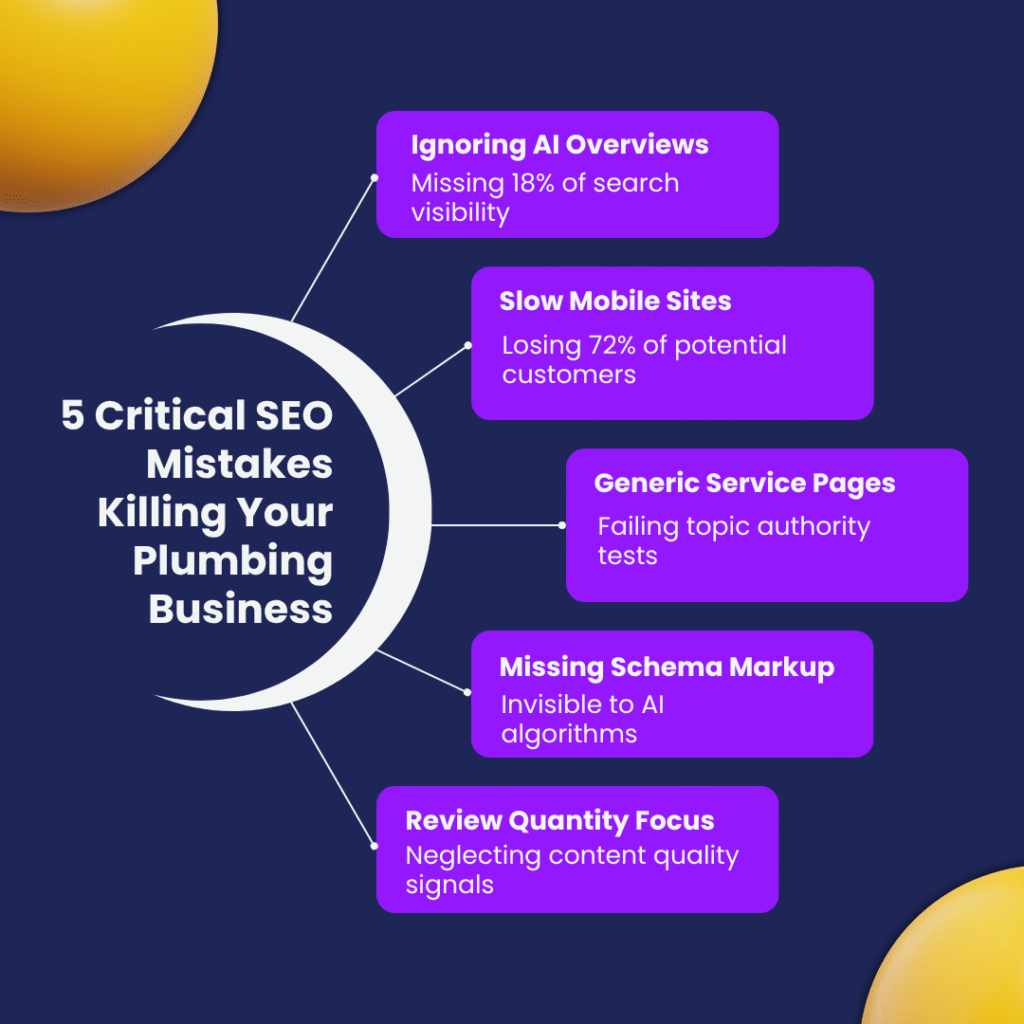
Measuring Success in AI-Powered Search Environments
Performance tracking requires new metrics that capture AI Overview inclusion and influence on customer behavior. Traditional ranking reports miss significant portions of search visibility when AI-generated responses dominate result pages.
AI Overview inclusion tracking reveals actual search visibility more accurately than keyword position monitoring. Tools that track when your business appears in AI-generated responses provide clearer pictures of competitive positioning.
Traffic source analysis must distinguish between traditional organic clicks and AI Overview referrals, as user behavior patterns differ significantly between these traffic sources. AI Overview visitors often arrive with higher purchase intent but may spend less time browsing before converting.
Lead quality metrics become more important than pure volume measurements. Customers who discover businesses through AI-generated responses typically have consumed more information before initial contact, making them more likely to hire immediately.
Revenue attribution should account for the research assistance that AI Overviews provide even when customers don’t immediately click through to websites. Multi-touch attribution models better capture AI Overview influence on customer decision-making processes.
Advanced AI Optimization Strategies
Sophisticated AI optimization approaches can provide additional competitive advantages for plumbing businesses willing to invest in comprehensive implementation strategies. These tactics require technical expertise but can generate significant long-term benefits.
Topic cluster development helps AI systems understand your expertise breadth and depth across related plumbing services. Creating interconnected content around themes like “residential plumbing maintenance,” “emergency repair services,” or “bathroom renovation plumbing” signals comprehensive knowledge to AI evaluation systems.
Natural language processing optimization ensures your content aligns with how customers actually describe plumbing problems and solutions. AI systems prefer content that matches conversational search patterns rather than traditional keyword-stuffed text.
Local entity optimization involves creating detailed schema markup and content around local landmarks, neighborhoods, and geographic features that help AI systems understand your service area expertise and community connections.
Collaborative content creation with other local businesses can strengthen local authority signals that AI systems recognize. Guest content exchanges with home improvement contractors, real estate agents, or other complementary service providers can boost local relevance assessments.
Professional vs. DIY Implementation Considerations
The complexity of AI-optimized SEO often exceeds typical small business technical capabilities, particularly for competitive plumbing markets where sophisticated implementation determines success or failure. Professional expertise becomes more valuable as AI systems demand higher content and technical quality standards.
Professional SEO services bring experience with AI system preferences, schema implementation challenges, and content strategies that align with generative search requirements. They also provide ongoing monitoring and adjustment services that ensure sustained performance as AI algorithms evolve.
DIY implementation remains possible for basic optimization tasks, but comprehensive AI visibility strategies require specialized knowledge and dedicated resources that most plumbing businesses cannot maintain internally while focusing on customer service operations.
Cost-benefit analysis typically favors professional services when considering the revenue impact of improved AI Overview inclusion and enhanced local search visibility. The investment in expert implementation often pays for itself within the first few months through increased lead generation.
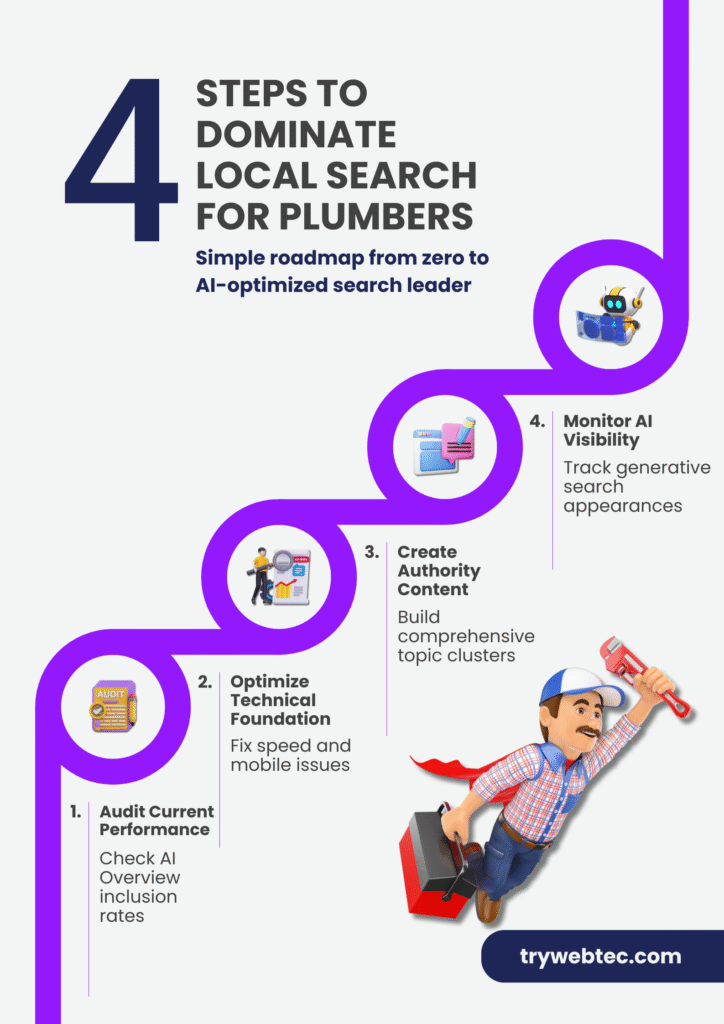
Webtec’s Approach to AI-Powered Plumbing SEO
The transformation to AI-powered search creates opportunities for plumbing businesses that adapt quickly while leaving behind those who ignore the changes. At Webtec, we’ve developed comprehensive strategies specifically designed for this new search environment.
Our approach begins with detailed AI Overview inclusion analysis that identifies exactly which search queries in your market trigger generative responses and which competitors currently benefit from AI visibility. This research guides content creation priorities and technical optimization efforts.
We implement sophisticated schema markup systems that help AI algorithms understand your plumbing expertise, service areas, and customer satisfaction levels. Our structured data approach goes beyond basic business listings to include detailed service descriptions, FAQ sections, and customer interaction signals that influence AI quality assessments.
Content development focuses on comprehensive topic coverage that positions your business as the authoritative source for AI-generated responses. Instead of traditional keyword-focused pages, we create detailed guides that address entire customer problems and solution paths.
Our SEO services include ongoing AI visibility monitoring and optimization adjustments as Google’s systems evolve. We track AI Overview inclusion rates, analyze content performance within generative responses, and adjust strategies based on changing algorithm preferences.
Technical implementation covers all aspects of AI-friendly website optimization, from Core Web Vitals improvements to advanced schema markup systems. Our website redesign services create foundations that support both user experience and AI content discovery requirements.
Integration with broader marketing efforts ensures your SEO investments complement other growth strategies. Our digital advertising solutions provide immediate visibility while AI-optimized SEO develops long-term organic authority.
The Future Belongs to AI-Ready Plumbing Businesses
The plumbing companies that thrive in 2025 and beyond will be those that recognize search has fundamentally changed. Traditional SEO tactics like keyword stuffing and basic local citations no longer provide competitive advantages when AI systems evaluate content quality, technical performance, and user experience comprehensively.
Your competitors who adapt to AI-powered search will capture increasing market share while businesses that ignore these changes see declining visibility and lead generation. The choice is straightforward: evolve your digital marketing approach or watch newer, more agile competitors steal your customers.
The transformation doesn’t happen overnight, but it also can’t be delayed indefinitely. Plumbing businesses that begin AI optimization now will establish competitive advantages that become increasingly difficult for others to overcome as Google’s AI systems become more sophisticated.
Professional implementation accelerates this transition while avoiding costly mistakes that can harm search visibility. The investment in expert AI optimization services typically pays for itself through improved lead generation within the first quarter of implementation.
Don’t let established competitors with thousands of reviews continue outranking you because they understand AI-powered search while you’re still playing by outdated rules. Contact our team today to discover how AI-optimized SEO can transform your plumbing business’s online visibility and customer acquisition in 2025’s new search landscape.



